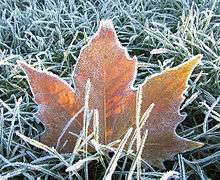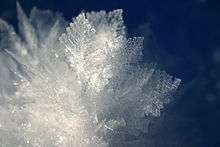Definify.com
Webster 1913 Edition
Frost
Frost
(frŏst; 115)
, Noun.
[OE. ]
frost
, forst
, AS. forst
, frost
. fr. freósan
to freeze; akin to D. varst
, G., OHG., Icel., Dan., & Sw. frost
. √18. See Freeze
, Verb.
I.
1.
The act of freezing; – applied chiefly to the congelation of water; congelation of fluids.
2.
The state or temperature of the air which occasions congelation, or the freezing of water; severe cold or freezing weather.
The third bay comes a
frost
, a killing frost
. Shakespeare
3.
Frozen dew; – called also
hoarfrost
or white frost
. He scattereth the hoar
frost
like ashes. Ps. cxlvii. 16.
4.
Coldness or insensibility; severity or rigidity of character.
[R.]
It was of those moments of intense feeling when the
frost
of the Scottish people melts like a snow wreath. Sir W. Scott.
Black frost
, cold so intense as to freeze vegetation and cause it to turn black, without the formation of hoarfrost.
– Frost bearer
(Physics)
, a philosophical instrument illustrating the freezing of water in a vacuum; a cryophorus.
– Frost grape
(Bot.)
, an American grape, with very small, acid berries.
– Frost lamp
, a lamp placed below the oil tube of an Argand lamp to keep the oil limpid on cold nights; – used especially in lighthouses.
Knight.
– Frost nail
, a nail with a sharp head driven into a horse’s shoe to keep him from slipping.
– Frost smoke
, an appearance resembling smoke, caused by congelation of vapor in the atmosphere in time of severe cold.
Frost valve
, a valve to drain the portion of a pipe, hydrant, pump, etc., where water would be liable to freeze.
– Jack Frost
, a popular personification of frost.
Frost
,Verb.
T.
[
imp. & p. p.
Frosted
; p. pr. & vb. n.
Frosting
.] 1.
To injure by frost; to freeze, as plants.
2.
To cover with hoarfrost; to produce a surface resembling frost upon, as upon cake, metals, or glass;
as, glass may be
. frosted
by exposure to hydrofluoric acidWhile with a hoary light she
frosts
the ground. Wordsworth.
3.
To roughen or sharpen, as the nail heads or calks of horseshoes, so as to fit them for frosty weather.
Webster 1828 Edition
Frost
FROST
,Noun.
1.
A fluid congealed by cold into ice or crystals; as hoar-frost, which is dew or vapor congealed.He scattereth the hoar-frost like ashes. Ps. 147.
2.
The act of freezing; congelation of fluids.The third day comes a frost, a killing frost.
3.
In physiology, that state or temperature of the air which occasions freezing or the coagelation of water.4.
The appearance of plants sparkling with icy crystals.FROST
, v.t.1.
In cookery, to cover or sprinkle with a composition of sugar, resembling hoar-frost; as, to frost cake.2.
To cover with any thing resembling hoarfrost.Definition 2026
Frost
Frost
German
Etymology
From Old High German frost
Pronunciation
Noun
Frost m (genitive Frostes or Frosts, plural Fröste)
Declension
Declension of Frost
Derived terms
- frostig
- Frostbeule
- Frostschaden
- Dauerfrost
frost
frost
English

Frost on a leaf and grass.

Close-up look at frost crystals.
Noun
frost (countable and uncountable, plural frosts)
- A cover of minute ice crystals on objects that are exposed to the air. Frost is formed by the same process as dew, except that the temperature of the frosted object is below freezing.
- 1748. David Hume. Enquiries concerning the human understanding and concerning the principles of moral. London: Oxford University Press, 1973. § 47.
- It is more probable, in almost every country of Europe, that there will be frost sometime in January, than that the weather will continue open throughout that whole month;
- 1748. David Hume. Enquiries concerning the human understanding and concerning the principles of moral. London: Oxford University Press, 1973. § 47.
- The cold weather that causes these ice crystals to form.
- (figuratively) Coldness or insensibility; severity or rigidity of character.
- Sir Walter Scott
- It was one of those moments of intense feeling when the frost of the Scottish people melts like a snow-wreath.
- Sir Walter Scott
- (obsolete) The act of freezing; the congelation of water or other liquid.
Derived terms
Terms derived from frost
Translations
cover of minute ice crystals
|
|
cold weather that would cause frost
|
|
Verb
frost (third-person singular simple present frosts, present participle frosting, simple past and past participle frosted)
- To get covered with frost.
- To coat something (e.g. a cake) with icing to resemble frost.
- To anger or annoy.
- I think the boss's decision frosted him, a bit.
Translations
to get covered with frost
to coat with white icing to resemble frost
Derived terms
Anagrams
Danish
Etymology
Pronunciation
- IPA(key): /frɔst/, [fʁ̥ʌsd̥]
Noun
frost c (singular definite frosten, not used in plural form)
Declension
Inflection of frost
| common gender |
Singular | |
|---|---|---|
| indefinite | definite | |
| nominative | frost | frosten |
| genitive | frosts | frostens |
References
- “frost” in Den Danske Ordbog
Icelandic
Etymology
Pronunciation
- Rhymes: -ɔst
Noun
frost n (genitive singular frosts, nominative plural frost)
Declension
declension of frost
See also
Old English
Alternative forms
Etymology
From Proto-Germanic *frustą, *frustaz, akin to Old High German frost, Old Norse frost.
Noun
frost m
Descendants
- English: frost
Old High German
Etymology
From Proto-Germanic *frustą, *frustaz, akin to Old English frost, Old Norse frost.
Noun
frost m
Descendants
- German: Frost
Old Norse
Etymology
From Proto-Germanic *frustą, *frustaz, akin to Old English frost, Old High German frost.
Noun
frost n
Descendants
References
- frost in Geir T. Zoëga (1910) A Concise Dictionary of Old Icelandic, Oxford: Clarendon Press